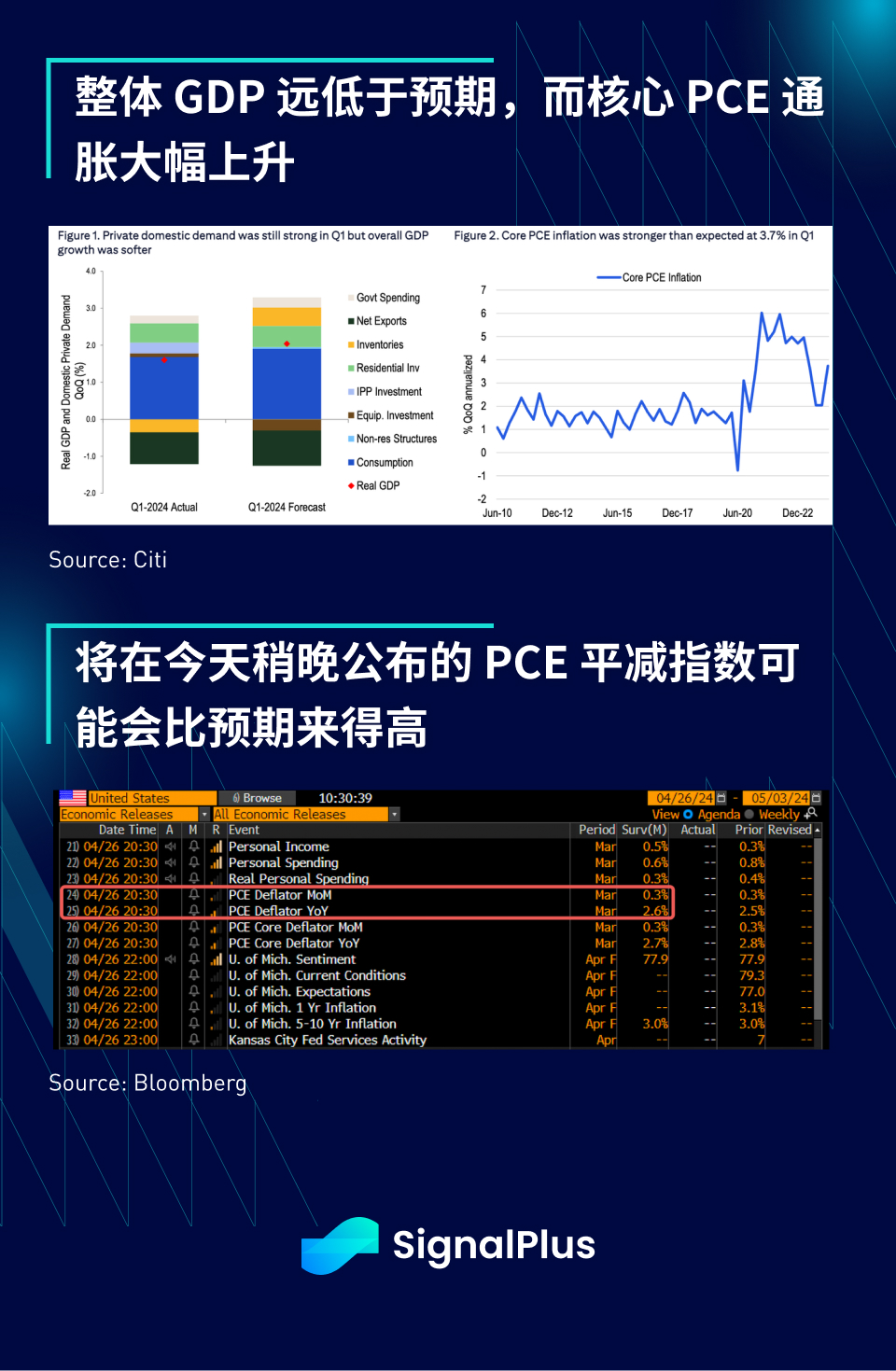SignalPlus Macro Analysis (20240426): US Q1 GDP Significantly Below Expectations


Several unfriendly economic data points affected risk sentiment during the New York trading session. The U.S. GDP growth for the first quarter was only 1.6%, far below the 3.4% in the fourth quarter, with personal consumption growth dropping from 3.3% to 2.5%, and goods spending falling from 3.0% to -0.4%. Inventory (-0.3%), net exports (-0.86%), and federal government spending (-0.2%) all weighed on first-quarter growth, while the deflator index inappropriately surged to 3.1% (vs. previous value 1.6%), the highest level since the second quarter of 2023, with local demand being the only bright spot, growing by 3.1%. Meanwhile, the core PCE price index for the first quarter jumped significantly to 3.7% (vs. previous value 2.0%), striking down the remaining optimism and indicating that today's released (and a focus for the Fed) March core PCE inflation data could be higher than the market forecast of 2.7%.

Overall, weak economic output combined with rising prices (can we call it… stagflation?) is quite unfavorable for asset prices. The U.S. Treasury yield curve jumped 6-8 basis points overall, with the 2-year yield briefly breaking above 5% before retreating to 4.99%. The cumulative rate cut expectations for 2024 have fallen back to just 1.4 times, a stark change compared to the market expectation of up to 8 rate cuts (!!) at the beginning of January.
Unless the PCE inflation data comes in significantly below expectations, the market expects Powell to make some "recalibrations" at next week's FOMC press conference. Recall Chicago Fed President Goolsebee's earlier interview:
"After six or seven months of significant improvement and inflation data close to 2%, we now see levels far above this, and we must recalibrate, we must wait and observe."
------ Chicago Fed Goolsebee
It is reasonable to expect the chair to retract the comments made in March and be forced to accept the fact that inflation developments have not gone as the Fed wished. Another variable is whether "hawkish recalibration" will affect the timing of the tapering of the balance sheet, with the market currently expecting a slowdown to begin as early as May, closely watching if any "minor participants" indicate they will continue with the tapering until they see further deterioration in reserve levels.

U.S. stocks showed a 1% decline for most of the day yesterday, mainly dragged down by disappointing earnings from Meta, followed by a +2% counter-rebound after the earnings reports from Microsoft and Alphabet. Microsoft's stock rose over 5% driven by broad revenue growth across sectors, while Google's advertising and service revenue exceeded expectations, announcing a $70 billion stock buyback and its first dividend, resulting in a stock price increase of over 11%.

In the cryptocurrency space, investors' attention remains diverted to this year's strong-performing memecoins/BTC runes, while the prices of major coins remain stagnant. With mainstream investor interest significantly slowing, BTC ETFs have seen outflows for two consecutive days, continuing a disappointing trend over the past four weeks. Currently, we maintain a neutral view on price movements and advise a cautious approach.


Finally, following the SEC's potential formal rejection of the ETH spot ETF in May, we see Consensys filing a lawsuit against the SEC, accusing the agency of "attempting to illegally regulate ETH through specific enforcement actions against Consensys and other potential targets," tit for tat.
The most important lesson learned in this field over the past few years? Always bet on the role of lawyers in this industry. Wishing everyone a pleasant weekend.











